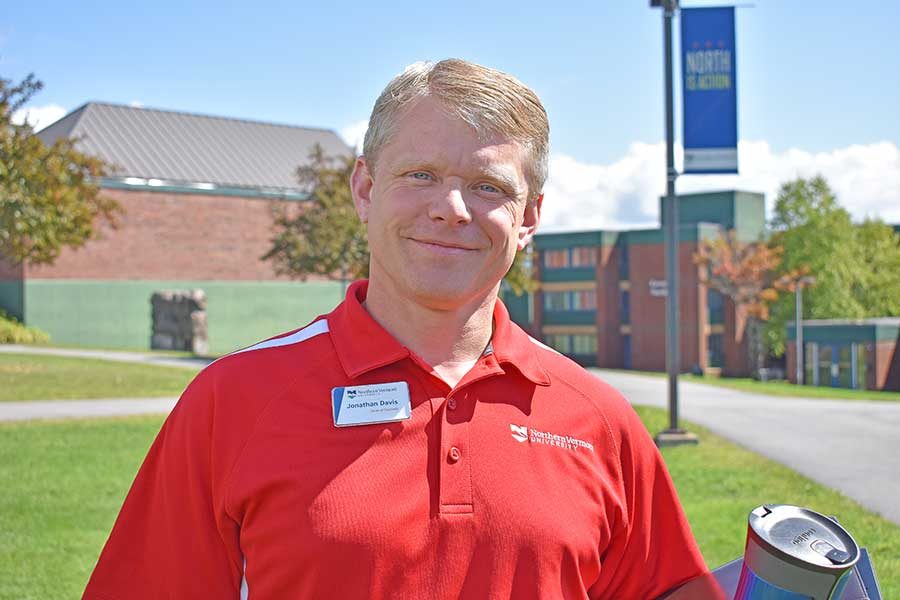All aspects of the student experience are under scrutiny during the optimization process
Johnathan Davis
As the Vermont Colleges System progresses through the merging of campuses into Vermont State University, a plethora of questions regarding the future of student life have arisen with many options under consideration.
“Student Affairs is a lot more than just housing,” says Jason Esner, who is both the dean of students at Vermont Technical College as well as chair of the Student and Residence Life sub team in the transformation.
“There’s student activities, student government, counseling, all the things that we’re doing discovery on,” he said.
Among these focuses, the team’s work also includes student residence life, admissions and enrollment, financial aid, the registrar’s team, athletics, and the marketing operations team.
“We make recommendations to the core team, which I sit on,” says Esner. “[Castleton’s dean of enrollment] Maurice Ouimet is the chair, so he brings (the recommendations) to the stakeholders.”
According to Esner, the stakeholders include the council of presidents- John Mills for NVU, Patricia Moulton for VTC, Thomas Mauhs-Pugh as interim president for Castleton- and then the chancellor’s office, which includes Sophie Zdatny and her team.
Ouimet is the chair of the CORE team leader for the Student Experience transformation team. This team is responsible for brainstorming ideas to make the student experiences equal across all campuses at NVU.
“We just finished what we call the discovery phase of transformation,” says Ouimet. The discovery phase involves researching and comparing how each campus runs and then proposing ideas to make the campuses run cohesively.
“So when it comes to things like residence life experiences, it’s not currently the same at Castleton as it is at Lyndon, or even between Lyndon and Johnson,” Ouimet said. “There’re some differences, even through the Northern Vermont University unification. Each campus is moving closer together and trying to adopt the same policies and practices, but there’s still some slight differences.”
With the unification quickly approaching, many wonder what plans are being considered for the future of student life at Vermont State University. “No decisions have been made,” Ouimet said. “And there are really no designs yet that have been completed.” This leaves a lot of scenarios up in the air.
One major question regards the future of athletics. Esner said the consolidation of all sports to one campus would be detrimental to the future of the other campuses.
“That was a proposal the former chancellor had made that I don’t think any of us in Randolph were very pleased with,” Esner said, referring to a proposal to consolidate all sports on one campus. “I think most people in Johnson and Lyndon were not pleased with that, either.” Without sports, it is expected that a campus would lose a lot of enrollment.
“The board voted it down and then that chancellor stepped down, and then the state came in and gave us bridge funding to come up with a new plan,” continued Esner. “So I don’t think there’s a desire at the state level or at the chancellor’s office to do that.”
NVU Dean of Students Jonathan Davis says, “nowhere have I heard of anything where activities and athletics are consolidated into one campus.”
Other campus experiences include housing, which is currently offered at every campus. However, as VSU fully merges, this might require some changes to make every campus cohesive.
Davis seems optimistic that this will be a move in the right direction for all students. “We are looking at activities to be provided on all the locations; for instance, housing …at all the locations,” says Davis. “The projects that we’re working on are about how we design housing operations, like health and wellness for students in the new university. So when you consider all five locations, we are designing what that experience looks like.”
As of right now, there are no plans to remove on-campus housing for any of the campuses. “We were told that we should be planning on having residential campuses on all of our locations,” says Esner, who noted that not offering the full residential experience would be a step backwards for a college campus.
While it is expected that on-campus housing will remain, the way it will be structured is yet to be determined. “As we think about hybrid offerings for students, do we start to offer options where students could live on campus for half a semester if they wanted to, instead of making them have a full contract for the whole semester?” asks Davis. This is one scenario being considered for student housing.
Currently, if a student wishes to apply to multiple universities within the Vermont State Colleges system, they will have to submit separate applications for each location. One goal in the new university is to implement a joint application to provide ease and clarity for users.
“Students will only apply once and they’ll be able to select what location they’re interested in, what program, other activities that they’re interested in, and they’ll be able to do that from one application,” Ouimet noted. “The same thing with financial aid, they’ll be applying at one time to Vermont State University. It’ll also make things a lot easier on the registrar’s office.”
This consolidation will potentially bring more applicants to each campus, since incoming students will be able to easily select multiple locations in their application.

First year student from Orlando, FL.
Working on her second bachelors.
Love poetry, anime, and her dog (mostly her dog).
Dreams of living in a van.



